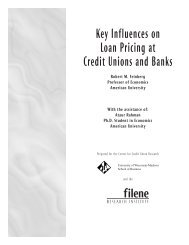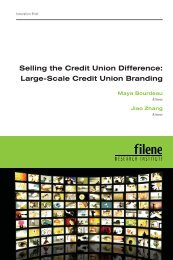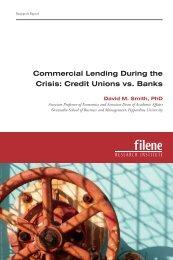Credit Union and Cooperative Patronage Refunds - Filene ...
Credit Union and Cooperative Patronage Refunds - Filene ...
Credit Union and Cooperative Patronage Refunds - Filene ...
You also want an ePaper? Increase the reach of your titles
YUMPU automatically turns print PDFs into web optimized ePapers that Google loves.
to us is a philosophical gulf between IOFs <strong>and</strong> co-ops. We assume<br />
that if you are affiliated with a credit union, this philosophical<br />
distinction drives your business model forward because credit unions<br />
are cooperatives too.<br />
To be clear, this report is not about the virtues of a collective society<br />
as opposed to a society organized around capitalism. <strong>Cooperative</strong>s—<br />
including credit unions—are the ultimate self-help business organization,<br />
3 <strong>and</strong> hence they are part of a capitalist system that allocates<br />
money <strong>and</strong> wealth across the economy through profits <strong>and</strong> losses.<br />
But cooperatives reward users rather than owners through patronage<br />
refunds distributed to the cooperative’s members on the basis of<br />
patronage (i.e., use). IOFs do not.<br />
Failing to pay a patronage refund is not an existential threat to a<br />
cooperative. As few as 27 credit unions out of more than 7,000 in<br />
the Callahan report regularly paid an annual patronage refund in<br />
each of the last five years. Later in this report we discuss the unresolved<br />
debate about whether to pay patronage refunds, a debate that<br />
is occurring within the board of directors <strong>and</strong> management of a farm<br />
credit association that is a member of the cooperatively owned Farm<br />
<strong>Credit</strong> System. Paying patronage refunds is far more accepted <strong>and</strong><br />
perhaps even expected for a farm credit association. Thus it will be<br />
obvious that the question of whether to pay a patronage refund is not<br />
an issue limited to credit unions.<br />
We note, however, that Callahan’s study of the 27 credit unions that<br />
paid patronage refunds documented that business growth, member<br />
involvement, <strong>and</strong> return on assets were all stronger for these 27 than<br />
for the other credit unions. It is very difficult to argue against the<br />
positive impact of paying a patronage refund. Our own experience<br />
with cooperatives paying a patronage refund is positive <strong>and</strong> entirely<br />
consistent with this conclusion.<br />
The balance of this report will discuss patronage refunds from several<br />
viewpoints. First, we drill down further to explore how patronage<br />
refunds are more than just a rebate, how they relate to capitalization,<br />
<strong>and</strong> how they are influenced by the principles of subordination of<br />
capital, service at cost, <strong>and</strong> co-op agency theory. These principles<br />
sum up the philosophical gulf that separates cooperatives <strong>and</strong> IOFs,<br />
<strong>and</strong> they drive the distribution of earnings to members <strong>and</strong> patrons<br />
rather than to investors.<br />
Second, we address the question of why cooperatives—<strong>and</strong> credit<br />
unions—need to be financially successful <strong>and</strong> generate earnings.<br />
Third, we discuss patronage refunds in the abstract, without the<br />
application of tax, <strong>and</strong> then we discuss four tax regimes as applied to<br />
alternative types of open membership cooperatives.<br />
4








